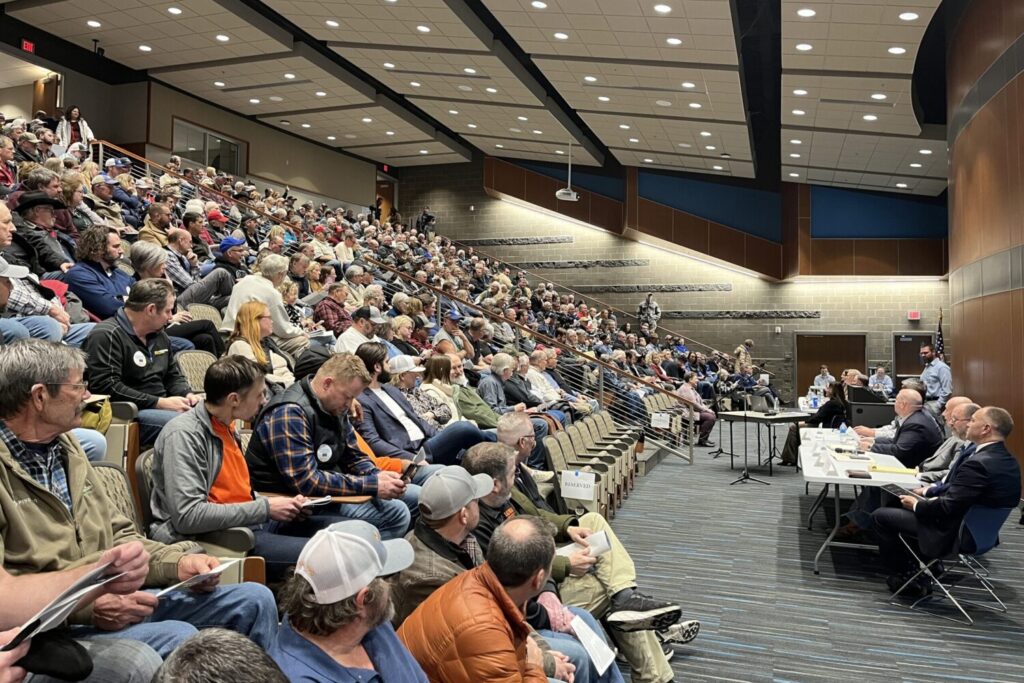
Hundreds of people fill the Southeast Technical College auditorium in Sioux Falls for a Public Utilities Commission hearing about a carbon dioxide pipeline proposal on Jan. 15, 2025. Opposing views on the project highlighted divisions within the Republican Party on economic development. (Makenzie Huber/South Dakota Searchlight)
The Republican primary election that will likely determine South Dakota’s next governor is nine months away. It already seems like it’s been going on forever.
The race has three candidates with Gov. Larry Rhoden waiting in the wings. Rhoden demurs when asked if he’s going to run, saying that election campaigns are too long. The governor has a point.
With so much time on their hands in such a long campaign, candidates have to make news any way they can, often by taking offense at something their opponent said, whether he said it or not.
A case in point comes from comments made in August by U.S. Rep. Dusty Johnson, one of the candidates for governor. Talking to the Greater Sioux Falls Chamber of Commerce, Johnson said the United States, rather than China, needs to be the dominant force in the race to develop the technology surrounding artificial intelligence. If South Dakota is going to get some of that business, it would have to welcome the data centers needed for AI. During his comments, Johnson bemoaned the South Dakota trend of protesting innovation and economic development.
“It’s un-American and it’s not at all capitalist,” Johnson was quoted as saying in a South Dakota Searchlight story. The country must win the battle for AI he said, noting that “We cannot do it if the only answer in front of us is, ‘No, always no.’”
Of late, some South Dakotans have been cranky about development. Whether it’s pipelines, a new prison or the data centers needed for AI, there always seems to be a group or two ready to say, “not in my backyard.”
The prevalence of this attitude worries Johnson, who called it “a disease that’s metastasizing.”
Governor race exposes divergent paths on economic development among South Dakota Republicans
Politicians are supposed to be a thick-skinned bunch, but Johnson’s declared opponents in the GOP governor’s race — Aberdeen businessman Toby Doeden and state Speaker of the House Jon Hansen, of Dell Rapids — couldn’t fire up their smartphones fast enough to declare on Facebook how offended they were by the congressman’s remarks.
Unfortunately, they were upset about something he never said.
A Doeden post about Johnson said, “This week he called me ‘un-American’ because I am opposed to using your tax dollars to support out-of-state billion-dollar corporations.”
Hansen had a similar take: “Well, if you oppose your tax money being given away in special interest tax subsidies to big tech companies like Facebook, well then Dusty Johnson says you’re being un-American.”
Well, that’s not what he said. In essence, Johnson said that automatically taking a position in opposition to progress is “un-American” and bad for the economy.
It’s easy enough to guess that Johnson favors the kind of loans and tax breaks that have been a staple of state government in South Dakota since the days of Gov. George Mickelson. After his comments to the chamber, Johnson told Searchlight that communities and states “need to step up” and offer incentives if they’re going to attract data centers. However, he never said that failing to support those specific kinds of incentives was un-American.
It just makes common sense that being against all of those types of incentives is short-sighted. Other states will make accommodations to attract data centers. If South Dakota elects to compete for economic development only on the basis of its merits, all it will have to recommend itself is a population with a solid work ethic and winters cold enough to keep the data center’s computer servers from overheating.
By promising to jettison economic development tools like loans, grants and tax breaks, candidates like Hansen and Doeden will say that they’re looking out for our tax dollars. Certainly that’s part of what a governor should do. However, the governor should also look out for our future.
Pulling back from years of the state’s economic development traditions is just another way of saying “not in my backyard.” That’s certainly not much of a campaign slogan. South Dakotans should expect more than that from the state’s next governor.
South Dakota commentary, free to your inbox: Sign up for our newsletter.

